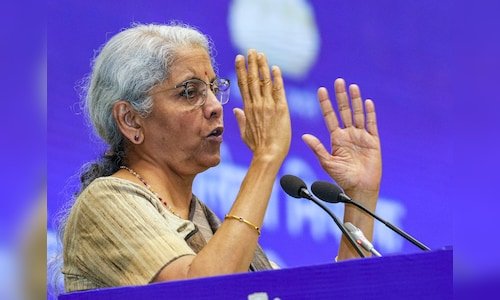Speaking in London at the High Commission of India, during an event titled “Opportunities and challenges for India’s quest to become a developed economy by 2047”, Sitharaman kicked off her first visit to the UK in her current Cabinet term by asserting that India was well positioned to leverage its internal strengths amid a shifting global trade landscape.
“The world has seen depressed growth for over several years, earlier it was low interest for long and now it’s going to be low growth for long, and that’s not happy news for anybody,” Sitharaman said.
ALSO READ: PM Modi’s timely call to Netanyahu after Oct 7 attack ‘true friendship’, says Israeli minister
Highlighting India’s consistent track record as the world’s fastest growing major economy over the past five years, she added: “We still think that momentum may moderate a bit, but it will still be India who will keep that growth… as our growth gets calibrated because of the consumption which exists domestically.”
She pointed to the demand for high-quality goods within the country as a key factor that has allowed India to benefit from globalisation since the 1990s. Even as US trade policy becomes more protectionist, India’s large domestic market continues to act as a magnet for global suppliers, she noted.
“The US is the leading trade partner for India. So, at a time when trade is going to be influenced by tariffs, measures which the US government is taking, we still will have to make sure that the strength that India has in domestic demand as a big magnet which can attract global supplies must be sustained and boosted,” she said.
This domestic strength, she said, is crucial for attracting foreign direct investment and boosting international manufacturing both for India’s market and for exports. “We think India, and a few emerging markets, are going to be the engines of growth. The global depressed growth, if it has to pick up, will have to be because of these engines,” she said.
While acknowledging that India is not immune to global risks—such as geopolitical tensions, trade disruptions, and financial volatility—Sitharaman said strategic policymaking focused on domestic capabilities will help the country navigate the uncertainty.
“In this phase of a rapidly evolving global policy landscape, with a number of imponderables, the government’s conviction is that the most effective path to building economic resilience is to foster domestic efficiencies and competitiveness,” she said, adding that her recent Union Budget reflects this approach.
During an interaction with Lord Nicholas Stern and N K Singh, co-chairs of the London School of Economics (LSE) India Advisory Board, Sitharaman spoke about the global trend of moving away from multilateralism toward stronger bilateral partnerships.
On the India-UK front, she expressed optimism about concluding the Free Trade Agreement (FTA) and the Bilateral Investment Treaty, both of which have been under negotiation. “We will also cover mutual recognition of certain professions, which is important for both the countries and science and technology where UK holds some premier research positions and India would like to seek cooperation and collaboration,” she said.
Asked whether the FTA talks had gained urgency in light of new US tariffs, Sitharaman clarified that the India-UK deal had long been in the works. “India’s negotiations with the UK on the FTA have been on for a very long time, resumed post-Brexit since February 2022. So, it is not as if we are rushing into an FTA because something has developed from the US,” she said.
She added: “This was to happen a long time ago, which we now hope with the new (Labour) government showing great deal of enthusiasm to have this agreement signed, we will be in a position to sign it sooner rather than later.”
Sitharaman’s UK stop is part of a broader European tour that will also take her to Austria later this week. Her London engagements began with a meeting with Shriti Vadera, Chair of Prudential Plc.
In a readout of the meeting, the Finance Ministry said Sitharaman discussed growth in India’s insurance sector following FDI policy reforms and emphasised the need to build up reinsurance and third-party insurance alongside health and other insurance products.
The two also discussed deeper engagement with the International Financial Services Centre at GIFT City. Sitharaman encouraged Prudential to consider using its ecosystem for global reinsurance and fund management services.
Vadera informed the finance minister about Prudential’s upcoming venture into the health insurance space in India.
ALSO READ: US tariff strategy aims to reshore manufacturing, boost jobs, says Scott Bessent



